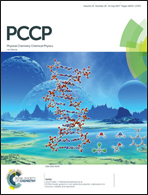B-DNA model systems in non-terran bio-solvents: implications for structure, stability and replication†
Abstract
We have computationally analyzed a comprehensive series of Watson–Crick and mismatched B-DNA base pairs, in the gas phase and in several solvents, including toluene, chloroform, ammonia, methanol and water, using dispersion-corrected density functional theory and implicit solvation. Our analyses shed light on how the molecular-recognition machinery behind life's genetic code depends on the medium, in order to contribute to our understanding of the possibility or impossibility for life to exist on exoplanetary bodies. Calculations show how a common non-terran environment like ammonia, less polar than water, exhibits stronger hydrogen-bonding affinities, although showing reduced selectivities towards the correct incorporation of Watson–Crick base pairs into the backbone. Thus, we prove the viability of DNA replication in a non-terran environment.



 Please wait while we load your content...
Please wait while we load your content...